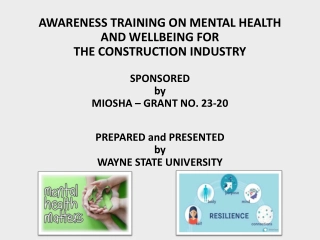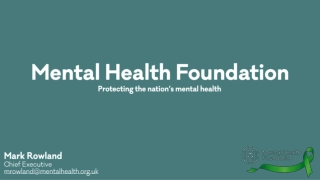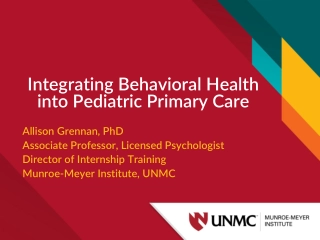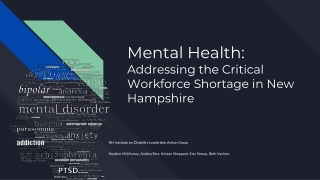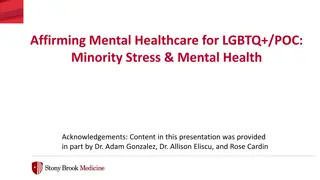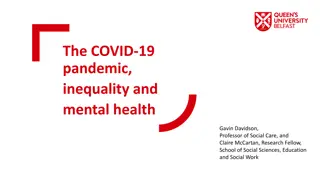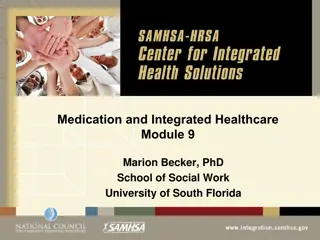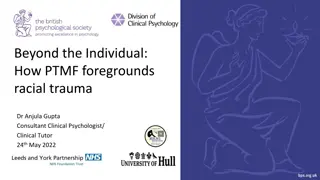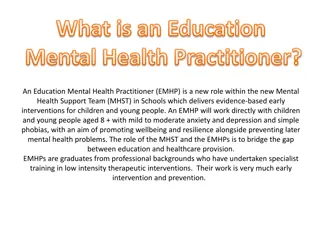Addressing Mental Health Challenges in Healthcare
Healthcare workers face significant mental health challenges, exacerbated by the COVID-19 pandemic. High levels of distress, acute stress, depression, and anxiety have been documented among healthcare professionals. Barriers to seeking help include stigma, time constraints, and professional consequences. Initiatives like the ePPE project aim to provide emotional support and resources for healthcare workers in need.
Download Presentation

Please find below an Image/Link to download the presentation.
The content on the website is provided AS IS for your information and personal use only. It may not be sold, licensed, or shared on other websites without obtaining consent from the author.If you encounter any issues during the download, it is possible that the publisher has removed the file from their server.
You are allowed to download the files provided on this website for personal or commercial use, subject to the condition that they are used lawfully. All files are the property of their respective owners.
The content on the website is provided AS IS for your information and personal use only. It may not be sold, licensed, or shared on other websites without obtaining consent from the author.
E N D
Presentation Transcript
1 Emotional PPE Project Jill Fieleke
2 Documented Need Even prior to COVID, healthcare workers (HCWs) were at increased risk for mental illness, addiction, and suicide 1, 2. COVID-19 impact: High profile suicides resulted in increasing awareness of need 50% of HCWs surveyed in Italy had signs of PTSD and 25% had signs of severe depression 3. 50% of 1257 doctors & nurses in China had signs of depression 4. Average score of 90 HCPs surveyed in the U.S. was in the clinically depressed range 5.
3 Shechter (2020) Findings Percent of participants who endorsed distress due to clinical, family, national, and personal concerns6 Personal Finance / Advanced Care 36% Childcare / Family Responsibilities 40% Social Distance from Family 64% Health of Family / Friends 71% Transmitting COVID to Family 74% 43% Sleep Disturbances 50% Patient Deaths 53% Triage or Rationing Decisions 60% Uncertain Clinician Status 70% Lack of Control 0 0.1 0.2 0.3 0.4 0.5 0.6 0.7 0.8 Personal and Clinical Work Environment Family and Concerns Outside of Clinical Environment
4 Shechter (2020) Findings Percentage of participants who screened positive for acute stress, depressive symptoms, and anxiety by clinical role6 70% 64% 60% 54% 53% 50% 44% 40% 40% 38% 40% 30% 20% 17% 15% 10% 0% Acute Stress Disorder ( PC-PTSD) Depression (PHQ-2) Anxiety ( GAD-2) Attending Physicians Residents / Fellows Nurses / AP Providers
5 Introducing ePPE Two neighbors having a conversation. The need for mental health support for HCW was recognized. Crowdsourced for mental health professionals willing to offer their time. Directory was built with intention of Daniel Saddawi- Konefka, MD, MBA Anesthesiology, Critical Care Physician Ariel Brown, PhD Neuroscientist, Mental Health Advocate, Entrepreneur removing barriers to emotional support.
6 Barriers to Getting Help >80% of HCPs report multiple barriers to seeking supportive services offered by their employer 7. The big three: stigma, time, professional consequences Stigma: Frequently a dominant aspect of hospital culture; perception that HCW will be seen as weak or that they are unable to do their job well. Time: Lengthy process of finding a therapist who takes their insurance and has an opening that matches HCW s schedule, can be prohibitive Professional consequences: Medical and nursing licensing boards often ask for applicant to release entire history of mental health treatment; may be rejected or have limited licensure based on results.
7 What is The Emotional PPE Project? A grassroots nonprofit (501(c)(3)) focused on lifting as many barriers as possible to getting professional emotional support. A public online directory with contact information of volunteer therapists. No cost and no insurance needed for HCWs. Addresses time, stigma, and professional consequences.
8 Project Overview Practitioner coverage as of Aug 4 Staffed by 100% unpaid volunteers; funded by individual donations. As of August 4, 364 mental health practitioners in the directory across all 50 states + DC. Our therapists have conducted sessions with HCWs across the country. Users include physicians, nurses, technologists, pharmacists, senior living caregivers. Currently engaged in awareness building campaign with upcoming story on TODAY show. MA set to 20 for visualization purposes
9 References 1. Dutheil F., et al., Suicide among physicians and health-care workers: A systematic review and meta-analysis. PloS one, 2019. 14(12): p. e0226361. 2. Kim M.S., et al., Mental disorders among workers in the healthcare industry: 2014 national health insurance data. Ann of Occup Environ Med, 2018. 30(1): p. 31. 3. Rossi R., et al., Mental Health Outcomes Among Frontline and Second-Line Health Care Workers During the COVID-19 Pandemic in Italy. medRxiv preprint, 2020. 4. Lai J., et al., Factors Associated With Mental Health Outcomes Among Health Care Workers Exposed to Coronavirus Disease 2019. JAMA Netw Open, 2020. 3(3): p. 203976. 5. Pearman A., et al., Mental Health Challenges of U.S. Healthcare Professionals During COVID-19. Front in Psych, 2020. 11: p2065. 6. Shechter, A., et al. Psychological Distress, Coping Behaviors, and Preferences for Support among New York Healthcare Workers during the COVID-19 Pandemic. General hospital psychiatry, 2020. 66: p. 1-8. 7. VITAL Worklife and Cjeka Search, 2017 Physician & Advanced Practitioner Well Being Solutions Survey Report. 2017.
10 Resilience, Growth, and Traumatic Stress following the COVID-19 Pandemic: Recommendations for Leaders Jonathan DePierro, PhD
11 Outline Psychological impact on workers Definitions of resilience Leader actions to support staff Individual resilience factors Mount Sinai s Response in NYC
12 Psychological Impact: Health Care Workers
13 Significant Psychological Impact: General Public Rates of distress are also rising in surveys of general public (Pierce et al, 2020) General population survey in Italy: 37% screen- in for PTS (Rossi et al, 2020)
14 Workplace Manifestation Research shows that PTSD and depression are associated with absenteeism & presenteeism (Ferry et al, 2015; Evans-Lacko, 2016) Now, many workers fear return to in-person work, particularly in hospital setting. Irritability, loss of interest in work, concentration lapses and worsening of burnout may occur and these reactions make sense given extreme stress. Secondary stressors pile up (e.g. childcare/school decisions, financial impact, unemployment) Moral injury may be driving anxiety and depression, particularly in health care workers (DePierro, Lowe, & Katz, 2020)
15 The Role of Resilience Resilience is often understood as the ability to bounce back after adversity/trauma. Realistic? Resilience in our view does not mean the absence of distress sometimes substantial growth can come out of emotional struggle ( posttraumatic growth ). Broken but transformed Resilience has been defined as a trait, a process, and an outcome. We know that it can be cultivated with practice
16 Context Matters: Resilience Reserve Leaders must be aware that resilience can be limited by economic and social circumstances, access barriers exist, and some workers are at particularly high risk of persistent distress. Hurricane Sandy s impact was an acute adversity for public housing residents and that their experience was shaped by cumulative social, physical, geographic, economic, and medical vulnerabilities. (Hernandez, 2018, p. 771) Diminished resilience reserve = an inventory of potential capacity to confront unanticipated challenges.
17 Supporting Resilience
18 Support From Leadership Request from staff Hear me Response Listen to and address concerns to the extent possible via multiple feedback channels (email, town halls, individual meetings); shared decision-making Minimize risk by providing adequate PPE, rapid testing, infection prevention strategies, and make accommodations for employees with medical risk factors Protect me Prepare me Provide access to training and access to experts; clear and unambiguous communication that we are in this together, support is available, everyone is being challenged, and that there are real risks. Support me Provide for basic needs, including childcare; provide self-guided support and/or access to individual psychotherapy; centralize support resources navigation. Show gratitude. Care for me Provide holistic support if ill; paid time off if quarantine is necessary Shanafelt, Ripp & Trockel, 2020
19 Draw on Lessons from Trauma- Informed Care (TIC) TIC is a model for better serving patients in medical settings who have trauma histories. It includes the following elements: o Screening o Interprofessional Collaboration o Understanding your own history and reactions o Understanding the health effects of trauma o Patient-centered care and communication Raja et al, 2015
20 Resilience Factors 1. Engage in optimism 2. Face fears 3. Know and live by your moral compass 4. Turn to faith/ spirituality 5. Establish and nurture a social supportive network 6. Find resilience role models 7. Attend to physical well-being 8. Develop brain fitness 9. Apply cognitive and emotional flexibility to trauma and other challenges 10. Find meaning and purpose in things Southwick & Charney, 2018
21 Mount Sinai s Staff Mental Health Response Immediate Response: Mobilized mental health liaisons to support staff, in person and in virtual formats 24/7 crisis support and resource navigation lines Multisensory recharge rooms Programs/partnerships to address basic needs (e.g. temporary housing for workers) Frequent rounding by leadership and Town Halls Long-term Response Center for Stress, Resilience and Personal Growth Centralized resource Resilience training Confidential mental health screening Confidential self-help/self-screening (app) Treatment & referrals Partnerships with leaders, unions, stakeholders and administration
22 Resilience Training Workshops We have developed a manualized peer co-led resilience workshop series for Mount Sinai workers. These workshops are time-limited and cover 10 evidence-based resilience factors over 11 meetings. 68 peer leaders have been trained Feedback as been overwhelmingly positive. For example, 86% of co-leader trainees indicated they would change their clinical practice as a result of the training course. Workshop materials will be made available in a mobile app to maximize our reach.
23 Thank You! Center for Stress, Resilience and Personal Growth https://icahn.mssm.edu/about/departments/psychiatry/clinical/str ess-resilience-personal-growth-center Jonathan DePierro, PhD Jonathan.depierro@mssm.edu
24 References DePierro, J., Lowe, S., & Katz, C. (2020). Lessons learned from 9/11: Mental health perspectives on the COVID-19 pandemic. Psychiatry Research, 113024. Evans-Lacko, S., & Knapp, M. (2016). Global patterns of workplace productivity for people with depression: absenteeism and presenteeism costs across eight diverse countries. Social psychiatry and psychiatric epidemiology, 51(11), 1525-1537. Ferry, F. R., Brady, S. E., Bunting, B. P., Murphy, S. D., Bolton, D., & O'Neill, S. M. (2015). The economic burden of PTSD in Northern Ireland. Journal of traumatic stress, 28(3), 191-197. Hern ndez, D., Chang, D., Hutchinson, C., Hill, E., Almonte, A., Burns, R., ... & Evans, D. (2018). Public housing on the periphery: vulnerable residents and depleted resilience reserves post-hurricane sandy. Journal of urban health, 95(5), 703-715. Pierce, M., Hope, H., Ford, T., Hatch, S., Hotopf, M., John, A., ... & Abel, K. M. (2020). Mental health before and during the COVID-19 pandemic: a longitudinal probability sample survey of the UK population. The Lancet Psychiatry. Raja, S., Hasnain, M., Hoersch, M., Gove-Yin, S., & Rajagopalan, C. (2015). Trauma informed care in medicine. Family & community health, 38(3), 216- 226. Rossi, R., Socci, V., Talevi, D., Mensi, S., Niolu, C., Pacitti, F., ... & Di Lorenzo, G. (2020). COVID-19 pandemic and lockdown measures impact on mental health among the general population in Italy. An N= 18147 web-based survey. medRxiv. Shanafelt, T., Ripp, J., & Trockel, M. (2020). Understanding and addressing sources of anxiety among health care professionals during the COVID-19 pandemic. Jama, 323(21), 2133-2134. Southwick, S. M., & Charney, D. S. (2018). Resilience: The science of mastering life's greatest challenges. Cambridge University Press.
25 Questions and Answers Session
26 Contact Us Mental Health America 500 Montgomery Street Suite 820 Alexandria, VA 22314 Facebook.com/mentalhealthamerica Twitter.com/mentalhealtham Youtube.com/mentalhealthamerica For certificate email: mhalpern@mhanational.org


